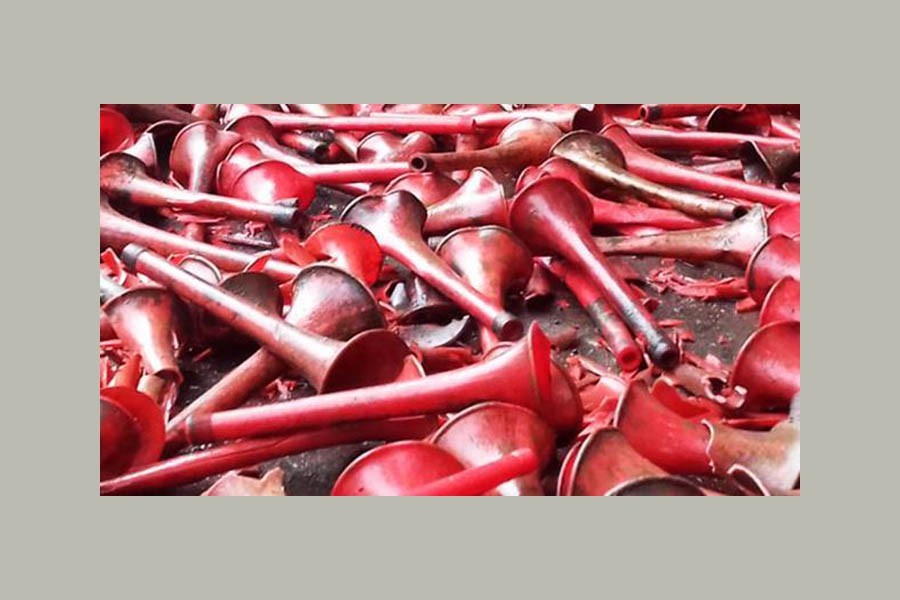The government is restricting import of hydraulic horns whose deafening honk causes hearing problems, posing the risk of mass deafness in densely-populated cities like Dhaka, sources said about measures envisaged in a new policy guiding imports.
Preparations are in the final stages for issuing the country's import policy order that also is going to restrict the import of casino boards and related equipment, as a clandestine run of such junkets recently created a stir in Bangladesh.
The brouhaha over the money-spinning gaming took place when law-enforcing agencies launc-hed a crackdown on gambling in 2019 in Dhaka.
The policy, titled Import Policy Order 2021-2025, which is now passing through fine-tuning with expert opinions, also provides some pats on the back of the importers, apart from the taboos. Currently, import order 2015-2018 is in practice.
Hydraulic horn is one of the immeasurable means of sound pollution that causes serious health problems, especially to children, according to doctors and environmentalists.
Former Vice-chancellor of Bangabandhu Sheikh Mujib Medical University Dr Pran Gopal Dutta, now a Member of Parliament, says this horn specially causes serious damage to children.
"A child below three years of age hears a horn producing 100 decibel (dB) of noise from a close range; he or she might lose his or her hearing power," opines the ENT specialist about the harm being done by noise pollution.
According to the World Health Organisation (WHO), generally 60 dB sounds can make a man deaf temporarily and 100 dB sounds can cause complete deafness. The noise of any busy street in Dhaka has been estimated at 60 to 80 dB, with the sound of hydraulic horns measuring as high as 95 dB.
Reports say reckless honking by vehicle horns in Dhaka-sometimes in a maddening medley by many at a time-poses the risk of mass deafness among the city-dwellers. Especially those who live in houses near main roads are in peril.
A drive against transports using unauthorized horns appeared to have foundered, somehow.
The new policy has eased fees required for import registration certificates (IRC) and their renewal fees. It also reduces the existing classifications based on the import volumes, to five classes or intervals from the existing six.
For example, if any importer imports Tk 1.0 million worth of goods or services a year, they will now need to pay for primary registration fees at Tk 3,000, down by Tk 2,000 from the existing rate.
Capital-machinery-import shipment period has been extended by seven months to 24 months from the date of purchase/sales. The other import period remained the same of nine months, according to the order seen by the Financial Express (FE).
The import of meats, e.g., beef, muttons and chickens, will be allowed or remain the same as of previous orders. But now importer will be required to obtain permission from livestock department.
The order states that the gold import now should be made through the Gold Policy 2018 instead of the foreign-exchange regulations act of 1947.
Bronze import, however, will need to comply with the foreign-exchange act 1947.
There will now be needed permission from the livestock department for import of animal-feed ingredients or inputs.
Bit salt or any other mineral salts that are not harmful for the human body now need to be approved by the ministry of commerce before importation.
However, the order has amended some practices that were not mentioned in the earlier orders. It says that BGMEA and BKMEA both can issue utilisation declarations (UDs) in favour of their members. Actually, the earlier orders mentioned only BGMEA's name. The same facility has been enjoyed by the BKMEA for long, but is not mentioned in the earlier import orders.
Mohammed Hatem, vice-president of BKMEA (Bangladesh Knitwear Manufacturers and Exporters Association), told the FE that they had urged the government to include it in the import policy for a long time.
"Actually we are entitled to issue the UDs but it was not mentioned in the import orders."
He said that it will be a good correction if the new import order mentions it.


